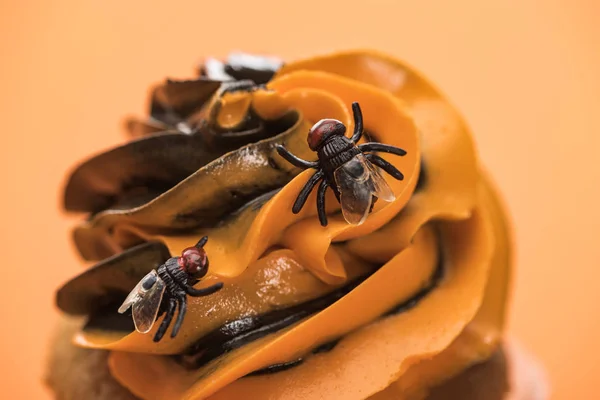What Happens If You Eat Food With Fly Eggs On It? Different fly species lay eggs in different foods and carry different types of bacteria. Houseflies, for example, typically lay eggs on decaying material, while fruit flies prefer ripe fruits. The bacteria they carry can lead to foodborne illnesses like E. coli or salmonella.
What Happens If You Eat Food With Fly Eggs On It?
Eating food with fly eggs can lead to health complications, especially if the food is not well-cooked. Fruit fly eggs, if ingested, can hatch in the stomach, leading to a condition known as intestinal myiasis, which can be harmful. The eggs can also become contaminated with bacteria, increasing the risk of bacterial poisoning or food poisoning. Symptoms such as cramps, stomach pain, vomiting, and nausea may accompany the digestive process following the ingestion of fruit fly eggs.
Cooking food to its proper internal temperature will kill most harmful bacteria, including those associated with fly eggs. Additionally, thoroughly washing fruits and vegetables can help remove eggs. Some people are more susceptible to foodborne illness than others due to existing health conditions or weakened immune systems.
It is important to take proper precautions when preparing food or buying groceries to prevent such incidents.
What You Should Do To Keep Fly Eggs Away From Getting Into Food
Preventing fly eggs from getting into your food requires a multi-pronged approach that tackles both the flies themselves and the environments they’re attracted to. Here are some key strategies:
1. Eliminate breeding grounds:
- Garbage: Keep your trash cans clean and sealed tightly. Empty them regularly and place them away from food preparation areas.
- Pet waste: Dispose of pet waste promptly and properly. Don’t let it accumulate in your yard or compost bin.
- Standing water: Eliminate any sources of standing water around your home, such as pet bowls, leaky pipes, or clogged gutters. Mosquitoes breed in stagnant water, and flies are attracted to the moisture.
2. Keep flies away from food:
- Food storage: Store food in airtight containers or cover it with plastic wrap. This will prevent flies from landing on and laying eggs on your food.
- Fruits and vegetables: Wash fruits and vegetables thoroughly before eating them, especially if they’re local or homegrown.
- Spills and messes: Clean up food spills and messes immediately. Flies are drawn to the smell of food residue.
- Window and door screens: Use screens on windows and doors to keep flies out.
3. Use natural fly repellents:
- Plants: Certain plants, like basil, mint, and citronella, have natural fly-repelling properties. Grow them around your home or place them near food preparation areas.
- Essential oils: Dilute essential oils like lavender, peppermint, or eucalyptus in water and spray them around your home.
- Vinegar traps: Mix equal parts apple cider vinegar, water, and sugar in a bowl. Cover the bowl with plastic wrap and poke small holes in it. The flies will be attracted to the sweet smell and get trapped inside.
4. Consider additional measures:
- Fly swatters and traps: These can be helpful in eliminating flies that manage to get inside your home.
- Sticky fly strips: Hang these strips in areas where you see a lot of flies.
- Professional pest control: If you have a severe fly problem, you may need to call a professional pest control company.
By following these tips, you can significantly reduce the risk of fly eggs getting into your food and keep your kitchen a fly-free zone. Remember, prevention is always the best strategy when dealing with pests!
Wondering How Fly Eggs Get On Your Food? Here’s How;
Fly eggs can end up on your food through various ways, some more obvious than others. Here are the key culprits:
Direct Contact: The most straightforward way is when a fly lands on your food and lays eggs directly on it. This is especially common with warm, moist, or sugary foods, as they attract flies for feeding and egg-laying. Flies have tiny hairs on their legs that can pick up eggs from other surfaces (like garbage, compost, or animal waste) and transfer them to your food when they land.
Indirect Contamination: Flies’ sticky feet can pick up tiny droplets of food residue or liquids containing eggs from contaminated surfaces. When they land on your food, these droplets can transfer the eggs.
Rain or wind can carry fly eggs from breeding areas like compost piles or trash cans onto your food. Additionally, flies can be attracted to the same types of food as other insects or animals like ants and rodents. If these creatures come into contact with fly eggs on your food, they can unintentionally spread them.
Internal Contamination: In some cases, fly eggs can be laid inside fruits and vegetables while they’re still growing, especially near manure or compost used as fertilizer. Washing them thoroughly can remove some eggs, but not all.
Factors influencing egg deposition:
- Type of fly: Different fly species have different preferences for food and egg-laying sites. Houseflies, for example, are more likely to lay eggs on moist, decaying organic matter, while fruit flies prefer ripe fruits.
- Environmental conditions: Flies are more active and lay more eggs in warm, humid weather.
- Presence of attractants: Strong smells from overripe fruits, spilled sugary drinks, or uncleaned garbage can attract flies and encourage them to lay eggs.
Preventing fly eggs on your food:
- Keep food covered and sealed in airtight containers to prevent flies from accessing it.
- Wash fruits and vegetables thoroughly. This helps remove eggs that might be on the surface.
- Clean up spills and messes immediately. Flies are attracted to food residues.
- Keep your kitchen and surrounding areas clean and free of potential breeding grounds like trash, compost, or pet waste.
- Use window and door screens. his physically blocks flies from entering your home.
Consider natural fly repellents: Plants like basil and lavender can deter flies.
ALSO READ: 27 foods you can eat without gaining weight









